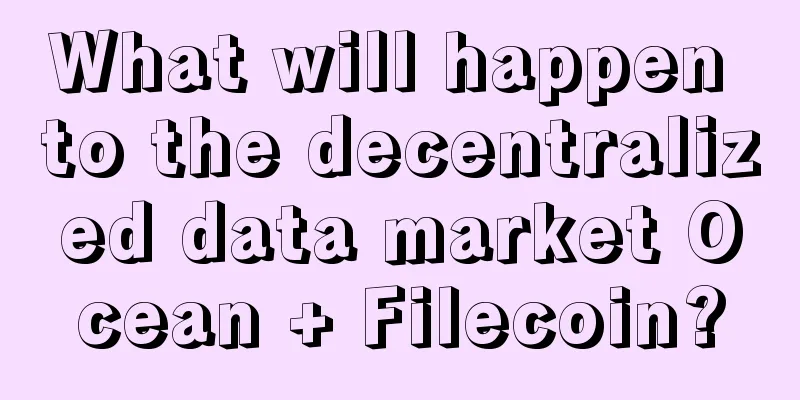What will happen to the decentralized data market Ocean + Filecoin?

|
Ocean Protocol founder Trent McConaghy once said in his speech at SMS: With Filecoin, users can use Ocean to launch their own Filecoin data market, or create a Filecoin dataDAO or index fund. With Ocean Protocol's tools and Filecoin's decentralized storage database, we have witnessed the birth of an open data economy for the first time. In today’s article, we will take you closer to Ocean Protocol and discuss with you what will happen when the decentralized data market Ocean + Filecoin comes together? Ocean Protocol is a decentralized solution for building data markets with a focus on security. The protocol connects data providers and users, increasing traceability, transparency, and trust for all parties involved. Preventing vendor lock-in, Ocean Protocol allows adding value to shared services and controlling data assets. Ocean Protocol aims to solve the world’s difficult problem of artificial intelligence development. There are companies that provide advanced algorithms to the AI industry, but these companies lack data. Then there are companies that have a lot of data, but they lack a way to share it in a fair, transparent and secure manner. Ocean Protocol aims to bring these two parties together to work towards a world that democratizes AI development. Ocean Protocol is an ecosystem for sharing data and related services. It provides a tokenized service layer that exposes data, storage, algorithms, and provides a set of deterministic proofs of availability and integrity, which are verifiable service protocols. Ocean is committed to advancing the unlocking of data, especially for artificial intelligence. It is designed for scalable data markets and uses blockchain technology to allow data to be shared and sold in a secure, reliable and transparent manner. We believe in the value of data and the ability of each individual to decide how it is used. Society is increasingly dependent on data, especially with the advent of artificial intelligence. However, a small number of organizations with massive data assets and AI capabilities have become powerful, posing a threat to a free and open society. 1. Fair compensation for all By establishing provenance across the platform, actors will work to understand what data is used when, where, and for what purpose, which is how the proposed asset control manifests in the ocean. This virtual paper trail will then facilitate attribution, and transparency itself will be mandated by design rather than at the mercy of government mandates. Regardless of what data people choose to share, any data shared should be fairly compensated. How? By implementing solidification markets. Solidification markets will allow ecosystem curators to identify relevant assets and signal relevance to the larger community through staking and bonding curves. 2. Self-governance for all We live in a data-driven world, and more data means more AI to process it. Predictions show that by 2025, we will create 463 exabytes of data every day. Data scientists will not be able to manage this massive amount of data, and automated tools will be needed to analyze, clean, and model it. At the same time, data and user privacy need to be protected. In recent years, data leakage incidents have occurred frequently, and the industries involved are no longer limited to the Internet financial industry, including: technology giants, government, communications, express delivery and even hotel chains have been reported to have data leakage problems. We can't help but wonder, where is privacy protection and privacy governance? Perhaps what we can do is to suspend the use of the account. Ocean Protocol has spent a lot of time and effort creating a Commons Data Marketplace, which is indeed an ideal use case for Ocean. The Marketplace connects data providers with data consumers, compute providers, and data scientists, thereby building a healthy and robust data ecosystem built on transparency, accountability, and equality. Ocean Protocol aims to transform the Commons into a one-stop shop where any and all types of data are readily available and owners can be appropriately rewarded for their contributions. I think data science is an important part of our lives. Market participants are being incentivized to share the data they own with others. Concerns about the spread of data ownership are addressed by integrating local computing, meaning no data needs to leave the location of the server, thereby mitigating risk for data owners. The specifications for these markets are still being developed today, but there is no doubt that when the market is ready, it will have a huge impact on the way we create and share value from data. Data flowing freely across teams and structures will unlock new insights. It will even step up the game between the tech giants and all the other giants. It will enable new services and new business models. It will change the way 99% of businesses operate today. 1. The world's data is growing exponentially, but only a small part of it is being fully utilized. Many companies have huge data but find it difficult to use it. On the contrary, many people or companies are facing the dilemma of data scarcity, especially in artificial intelligence. Ocean Protocol allows data providers to share data, maintain control and have transparency. 2. Ocean Protocol is a business, technology and governance framework that interweaves to share and sell data and services in a secure way. Ocean Protocol stores metadata, data links, provides a licensing framework and has pricing tools. Numerous data marketplaces can hook up to Ocean Protocol to provide a "last mile" service to connect data providers and consumers. Ocean Protocol is designed so that data owners are not locked into any single marketplace. Data owners control each data set. 3. The main roles in Ocean Protocol are data providers, data consumers, data markets, service providers, and network maintainers. Data providers provide data. Data consumers obtain data for their own use. Data markets connect data producers and data consumers. Service providers provide computing, storage, and algorithms for sale. Network maintainers support Ocean Protocol by running nodes within the network. Ocean Protocol is a protocol and network on which data marketplaces can be built to unlock sharing and selling of data. It enables data to be shared. Most other projects are decentralized/centralized data marketplaces. Ocean is complementary to centralized and decentralized data marketplaces as it provides an additional channel for marketplaces to publish their services. Enigma and Datum are early movers, but are more complementary to Ocean Protocol than competitors. The difficulty in the development of artificial intelligence lies in the separation of algorithms and data. Decentralization can achieve fair, transparent and secure data sharing, greatly liberating the AI market. It has already established partnerships with institutions and projects such as the Singapore government, SingularityNET, Mattereum and IBM Watson AI XPRIZE. Decentralized applications are the solution of the future because they are more secure, as they do not store the user’s data in a centralized repository, but in decentralized nodes. Another important aspect for future adoption is that people can use smart contracts for payments: users are looking for solutions to ensure that all the data they publish will not be altered and they will remain the owner, without the need for censorship. In Ocean Protocol, storage strategies (software redundancy, data retrieval speed, etc.) can be customized for each data market. Users can self-host data or store it on the IPFS protocol. However, there are certain limitations in data management and configuration of storage resources. In addition, relying on third-party services that can extend management and configuration options will lead to data centralization. Ocean Protocol now has Filecoin’s decentralized cloud storage capabilities. The proof-of-concept aims to provide multiple customizable storage options and reduce expenses for data providers. The integration was completed by Ocean service partner Protofire, which received a grant from Filecoin. Ocean Protocol is partnering with Protofire to implement a storage strategy that promotes a wider range of customizable options in a decentralized manner. "The Filecoin Development Grant Program provides teams like Protofire with the opportunity to build valuable integrations across the Web3 landscape. Through its partnership with Ocean and IPFS/Filecoin, Protofire is enabling users to seamlessly store their data on a decentralized web." To achieve the set goals, Protofire integrated Filecoin storage into the Ocean Protocol Marketplace. Now, data providers can enjoy more different configuration options, including data replication and extraction, geographical distribution of access rights, and the availability and size of stored data. In addition, data publishers no longer need to rely on intermediary services to manage storage resources. At the same time, data users are able to cut costs for data providers. We have reason to believe that in the future, the data and distributed storage markets will effectively build the entire ecological development and better meet users' needs in terms of data set size , redundancy, retrieval speed and cost . |
>>: Cinneamhain Ventures partner: Data shows that TRX may be under investigation by US regulators
Recommend
The birth order of children can be seen from the children line in palmistry
How to read the children line in palmistry? The c...
Analysis of forehead wrinkles
People will gradually develop forehead wrinkles a...
What are the facial features of unlucky men?
What are the facial features of unlucky men? If y...
How is the fortune of a woman with long drooping eyebrows?
In modern society, no matter what the interperson...
These people have their own way of doing things.
Getting things done is a skill that we modern peo...
OKcoin founder Xu Mingxing buys a shell to enter the New Third Board
Bitcoin was once very popular. Now, Xu Mingxing, ...
What does it mean when a dwarf hides three knives?
Many times we will relax our vigilance towards a ...
A man's face reveals whether he is popular with women
Whether a man is popular with women can be seen f...
Filecoin is online, is this really the end?
The following article is from the vernacular bloc...
Vietnam Bitcoin Ponzi Scheme on the verge of collapse
Since the birth of Bitcoin, there have been a num...
Hedge funds are investing in Bitcoin, but three reasons are a hindrance
The price of Bitcoin has risen by nearly 180% thi...
How is the financial fortune of women with prominent brow bones in middle age?
Some people may not have good fortune in their yo...
Analyst: Miners’ average cash flow indicator shows that BTC may have reached a local peak
Planet Daily News In 2018, when Bitcoin fell to $...
The marriage palace in the face explains a person's fortune in detail
The area from the eyebrows and the end of the eye...
Face fortune telling and fortune telling
The face fortune chart for the hundred years of l...









